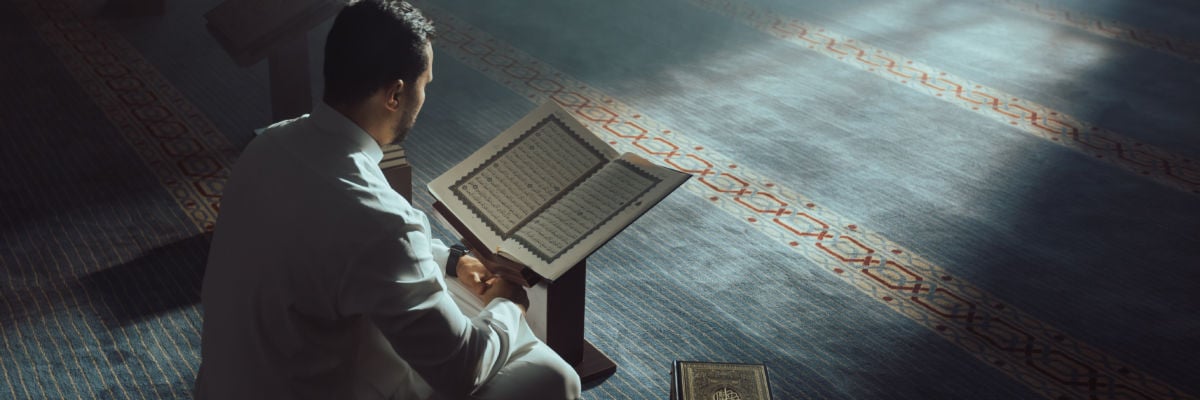
Catholic apologists keep very busy clearing up common misconceptions about the Faith: explaining how the Church’s teaching, practice, and history are misunderstood—or willfully misrepresented—by its opponents.
Islam, too, has its apologists. They also claim that many critiques of the Muslim religion are based on ignorance or animus, and insist that the record must be set straight.
One such apologist is Princeton University Muslim chaplain Sohaib Sultan, whose recent piece in Time, “ISIS Is Ignoring Islam’s Teachings on Yazidis and Christians,” would seem to be something that every Catholic, and indeed every free person, should welcome. Sultan condemns the Islamic State (formerly ISIS) and other Islamic jihadists, and asserts that their violent actions have nothing to do with true Islam. Is he correct? Are those who connect Islam with violence as grossly mistaken as those who claim that Catholics are cannibals for eating Jesus’ body, or that we worship Mary as a goddess?
Unfortunately, too often the assertions of Muslim apologists do not inspire confidence that they’re actually engaged in an effort to dispel falsehoods with truth. Sultan’s piece is a textbook example of the difference between defending one’s faith and whitewashing it; between engaging the evidence against one’s position and blithely waving it aside or even denying it exists.
“Until Religion Is All for Allah”
For example, he claims that “when the Quran allows (and, sometimes, even encourages) Muslims to engage in just fighting and resistance, it is in order to deter those who wage wars without just cause and those who engage in religious persecution.” Here and throughout his article, however, his use of Quranic passages is selective and out of context. He doesn’t mention, for example, the exhortation to Muslims to fight not just until “persecution is no more,” but also until “religion is all for Allah” (8:39). He mentions only in passing, without quotation, the Quran’s call to Muslims to fight against the “People of the Book” (primarily Jews, Christians, and Zoroastrians) until they “pay the jizya with willing submission and feel themselves subdued” (9:29)— i.e., until they submit to Muslim hegemony.
Claiming that true Islam does not support the demolition of churches and synagogues, Sultan quotes the Quran inveighing against the destruction of houses of worship: “For, if God had not enabled people to defend themselves against one another, monasteries and churches and synagogues and mosques — in which God’s name is abundantly extolled would surely have been destroyed” (22:39–22:40). This would seem to be a blanket prohibition against the destruction of churches; proof that jihadists who commit that act do so in defiance of their religion.
Unfortunately, though, this is not all that the Quran says. The Quran many times reaffirms that its message is the same as that of the Torah and the Gospels, and calls on Jews and Christians to note that and accept it as divine revelation. Allah tells Muhammad: “And We have revealed to you the Book in truth, confirming that which preceded it of the Scripture and as a criterion over it” (5:48), after affirming that in the Gospel was “guidance and light, confirming that which preceded it of the Torah as guidance and instruction for the righteous” (5:46). Those who do not accept the new revelation are castigated and threatened with punishment: “Indeed, they who disbelieved among the People of the Scripture and the polytheists will be in the fire of Hell, abiding eternally therein. Those are the worst of creatures” (98:6).
So while “God’s name is abundantly extolled” in the churches and synagogues of those who acknowledge Muhammad and the Quran, the same cannot be said of the churches and synagogues of “they who disbelieved among the People of the Scripture.” This is how the Islamic State, in destroying churches and other houses of worship in Iraq and Syria, can justify its actions on solid Islamic grounds. But Sultan does not address this— thereby rendering his piece powerless to refute the actions of the Islamic State, however comforting his arguments may sound to uninformed non-Muslims.
The omissions continue. Sultan quotes the Quran saying about various religious groups that “God will decide between them on Resurrection Day” (22:17), arguing that since God will judge all in the next world, the Islamic State should not act as the executor of divine wrath in this world. Yet the Quran also says: “And as for those who disbelieved, I will punish them with a severe punishment in this world and the Hereafter, and they will have no helpers” (3:56). If the unbelievers are to be punished in this world as well as in the next, how is the Islamic State departing from Quranic orthodoxy by bringing them that punishment?
No Compulsion in Religion?
Sultan also claims that “ISIS insistence that Christians either ‘convert, leave, or die’ defies the Quranic command: ‘Let there be no compulsion in religion’ (2:256).” Islamic spokesmen in the West frequently quote this to disprove the contention that Islam spread by the sword, or even to claim that Islam is a religion of peace. But Sultan does not mention—even to refute it—the quite different understanding that many Muslim authorities have of this verse. According to an early Muslim scholar, Mujahid ibn Jabr, this verse was abrogated by Quran 9:29, which commands Muslims to fight the People of the Book. Others, however, according to the Islamic historian Tabari, say that 2:256 was never abrogated, but was revealed precisely in reference to the People of the Book. They are not to be forced to accept Islam, but may practice their religions as long as they pay the jizya (poll-tax) and “feel themselves subdued” (9:29).
Those who offer 2:256 to claim there is no Islamic imperative to wage jihad against unbelievers omit or fail to recognize that the aim of jihad is not the forced conversion of non-Muslims. For non-Muslims brought to heel by jihad, the choice (as laid out by Muhammad himself) is conversion, death, or subjugation (dhimmitude). The twentieth-century Muslim Brotherhood theorist and Islamic scholar Sayyid Qutb accordingly denies that 2:256 contradicts the imperative to fight until “religion is for Allah” (8:39; 2:193). “Islam has not used force to impose its beliefs,” he says. Rather, jihad’s “main objective has been the establishment of a stable society in which all citizens, including followers of other religious creeds, may live in peace and security”—peace and security meaning, for Qutb, subordinate status for non-believers in an “Islamic social order.”
In this light, the Quranic idea that there is “no compulsion in religion” fits together without any trouble with the exhortation to fight until “religion is for Allah.” Muslims must fight until “religion is for Allah,” but they don’t force anyone to accept Allah’s religion. They enforce subservience upon those who refuse to convert, such that many of them subsequently convert to Islam to escape the humiliating and discriminatory regulations of dhimmitude. Only at the end of the world will Jesus, the Prophet of Islam, return and Islamize the world, abolishing Christianity and thus the need for the jizya. Then religion will be “for Allah,” and there will be no further need for jihad.
And indeed, Sultan acknowledges that the Islamic State demanded jizya payments from the Christians in Mosul, in accord with 9:29, but he waves this away with the assertion that this verse’s “application is vague and it can very well be argued that such an imposition was only intended to manage troublesome and treacherous religious minorities.” Yet the Quran’s command to subjugate the People of the Book and make them pay this tax is nowhere restricted to those People of the Book who are “troublesome and treacherous”; it is, in fact, not restricted at all. Nor was its application vague in the great caliphates of history. Islamic authorities frequently emphasized, long before the advent of the Islamic State, that the purpose of the jizya was to signify and enforce the subjugation of non-Muslims, but of such examples Sultan makes no mention.
A Dubious Document
Instead, he invokes an ancient document, purportedly from Muhammad, granting generous treatment to the Christians under Muslim rule. Known as the Achtiname, it was supposed to have been written by Muhammad around 628 to the monks of St. Catherine’s Monastery in the Sinai. Unfortunately, it is of even more doubtful authenticity than everything else about Muhammad’s life. Instead it bears all the earmarks of being an early medieval Christian forgery, perhaps developed by the monks themselves in order to protect the monastery from the depredations of zealous Muslims, who completed their conquest of Christian Egypt in 642. Modern scholars doubt its authenticity, and the prevailing opinion among Muslims is likewise dubious.
Citing the Achitiname against the Quran to prove that to follow Islam actually means to tolerate other faiths, then, is like citing the “Gospel of Jesus’ Wife” to prove that real Christians must believe Jesus was married.
Honest Catholic apologists strive to dispel clouds of myth and falsehood with the light of fact and reason. Muslim apologists like Sohaib Sultan, when they try to whitewash their religion’s role in present-day atrocities, do the opposite: they pile on myths and half-truths to obscure or distract from Islam’s plain prescriptions.
Much confusion on matters like this would be dispelled if non-Muslims understood how Muslims view religious authority. In a future post, I will explain how Muslims view Quranic verses and prooftexts, where the closest thing to a Muslim magisterium can be found, and how to best to weigh arguments when someone quotes the Quran to say “X” but a Muslim apologist or a journalist quotes it to say “Y.”



